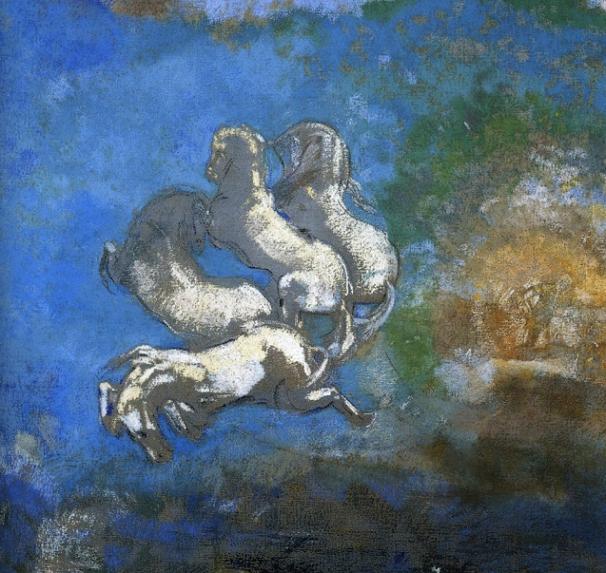
LIFE AS MYTH
![]()
JOURNAL
![]()
JOURNAL 2007
![]()
Following a white hart
Exploring myth & meaning
![]()
SPRING 2007
The gift of fire
![]()
LIFEWORKS
![]()
ATLAS
![]()

SPRING 2007
THE CHARIOT OF THE SUN
Apollo's sun chariot. Odilon Redon. 1914. Musee d'Orsay, Paris.
Down, down I come, like glist'ring Phaëton.
Richard II (Act III, scene iii). William Shakespeare, 1595Phaëton was the son of Eos and Apollo. When he was but a youth he bragged to his friends that he was the child of the sun-god. However, his friends did not believe his story and ridiculed him. Upset by this lack of belief, Phaëton went to Mount Olympus and complained to his father. Apollo loved his son and made a rash promise: Ask for anything and I will give it, as proof that I am your father. Without hesitation, Phaëton asked for a chance to drive the sun-chariot. At first Apollo refused, warning his son that what he requested was too dangerous. He offered many other wonderful things instead but his son insisted that all he desired was to drive the chariot of the sun.
Apollo lead his son to the stables which housed the chariot. He instructed Phaëton to drive the horses through the middle way, or a great tragedy would befall him. However, Phaëton did not listen to his father's advice. Grabbing the reins, he jumped into the chariot and cracked a whip over the heads of the four sun-horses. The mythical beasts, sensing an unsure hand, charged out of their stalls and raced toward the highest heavens. As they left the earth further and further behind, the planet grew cold and dark. When Phaëton tried to stop their upward climb, the steeds turned and plunged toward the earth, drawing so close that the fiery chariot set the world on fire.
Zeus looked down from Mount Olympus and, seeing the havoc below, threw a thunderbolt at Phaëton. The youth died instantly and fell out of the sun-chariot into the river Eridanos. On learning of his death, his sisters transformed into poplars that wept amber tears.

